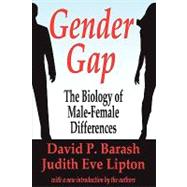Gender Gap: How Genes and Gender Influence Our Relationships
, by Barash,David P.- ISBN: 9780765808868 | 0765808862
- Cover: Nonspecific Binding
- Copyright: 10/31/2001
Let's face it, say Barash and Lipton: Males and females, boys and girls, men and women are different. To be sure, these differences are often heightened by distinctions in learning, cultural tradition, and social expectation, but underpinning them all is a fundamental difference that derives from biology. Throughout the natural world, males are those creatures that make sperm; females make eggs. The oft-noticed "gender gap" derives, in turn, from this "gamete gap." In Gender Gap, Barash and Lipton (husband and wife, professor and physician, biologist and psychiatrist) explain the evolutionary aspects of male-female differences.After describing the theory underlying the evolutionary explanation of male-female differences -- in accessible, lay-person's language -- they show how it applies to specific examples of animal behavior. Then, they demonstrate comparable male-female differences in the behavior of human beings cross-culturally, as well as within the United States. Barash and Lipton apply this approach to male-female differences in sexual inclinations, propensities for violence, parenting styles, and childhood experiences. They invoke much work within the traditional social sciences, such as psychology, anthropology, and sociology, which have typically ignored biological factors in the past.Part of the highly successful revolution in scientific thought has been the recognition that evolutionary insights can illuminate behavior, no less than anatomy and physiology. This new discipline, sometimes called "sociobiology" or "evolutionary psychology, " promises to help us make sense of ourselves and of our most significant others, shedding new light on what it means to be male orfemale. Now available in paperback with a new introduction by the authors, this accessible volume integrates work from a variety of fields, applying a new paradigm to research on gender differences.






